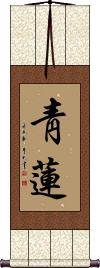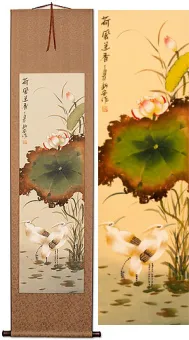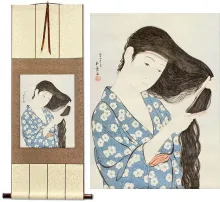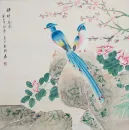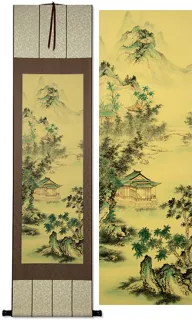Many custom options...
And formats...

Not what you want?
Try other similar-meaning words, fewer words, or just one word.
Feel free to email me with your request. If it's easy, I'll translate it for free and add it to this database of calligraphy for you.
Blue Lotus in Chinese / Japanese...
Buy a Blue Lotus calligraphy wall scroll here!
Blue Lotus
靑蓮 is a common title for Blue Lotus.
靑蓮 is often used in a Buddhist context for blue lotus from the Sanskrit “utpala.” This often refers to the clarity and purity of the lotus blue eyes possessed by a Living Buddha. It can also represent the purity of mind (without desire, suffering, fear, etc.).
This in-stock artwork might be what you are looking for, and ships right away...
Gallery Price: $108.00
Your Price: $59.88
Gallery Price: $108.00
Your Price: $59.88
Gallery Price: $72.00
Your Price: $39.88
Gallery Price: $72.00
Your Price: $39.88
Beautiful Blue and Gold Chinese Birds & Flowers Painting
Discounted Blemished
Gallery Price: $71.00
Your Price: $39.00
Gallery Price: $101.00
Your Price: $55.88
Gallery Price: $50.00
Your Price: $29.88
Gallery Price: $63.00
Your Price: $34.88
Gallery Price: $63.00
Your Price: $34.88
Gallery Price: $72.00
Your Price: $39.88
Gallery Price: $50.00
Your Price: $29.88
Gallery Price: $268.00
Your Price: $148.88
Gallery Price: $72.00
Your Price: $39.88
Gallery Price: $83.00
Your Price: $45.88
Not the results for blue lotus that you were looking for?
Below are some entries from our dictionary that may match your blue lotus search...
| Characters If shown, 2nd row is Simp. Chinese |
Pronunciation Romanization |
Simple Dictionary Definition |
蓮 莲 see styles |
lián lian2 lien ren れん |
More info & calligraphy: Lotus(out-dated or obsolete kana usage) (1) (kana only) sacred lotus (Nelumbo nucifera); Indian lotus; lotus; (2) rose of Sharon (Hibiscus syriacus); (kana only) sacred lotus (Nelumbo nucifera); Indian lotus; lotus; (f,m,s) Ren puṇḍarīka, the lotus, especially the white lotus, Numphoea alba; padma, especially the Nelumbium speciosum; utpala, the Nymphoea coerulea, the blue lotus; kumuda, Nymphoea esculenta, white lotus, or N. rubra, red lotus; nīlotpala, N. cyanea, a blue lotus. The first four are called white, red, blue, and yellow lotuses; but the white lotus is generally meant unless otherwise specified. |
地獄 地狱 see styles |
dì yù di4 yu4 ti yü jigoku じごく |
More info & calligraphy: Hell(1) {Buddh} hell realm; Naraka; (2) {Christn} Hell; (3) hell; misery; nightmare; inferno; (4) place where a volcano or hot springs constantly spew smoke or steam; (place-name) Jigoku naraka, 捺落迦 (or 那落迦) ; niraya 泥犂; explained by 不樂 joyless; 可厭 disgusting, hateful; 苦具, 苦器 means of suffering; if 地獄 earth-prison; 冥府 the shades, or departments of darkness. Earth-prison is generally intp. as hell or the hells; it may also be termed purgatory; one of the six gati or ways of transmigration. The hells are divided into three classes: I. Central, or radical, 根本地獄 consisting of (1) The eight hot hells. These were the original hells of primitive Buddhism, and are supposed to be located umder the southern continent Jambudvīpa 瞻部州, 500 yojanas below the surface. (a) 等活 or 更活 Saṃjīva, rebirth, where after many kinds of suffering a cold wind blows over the soul and returns it to this life as it was before, hence the name 等活. (b) 黑繩 Kaslasūtra, where the sufferer is bound with black chains and chopped or sawn asunder. (c) 線合; 衆合; 堆壓 Saṃghāta, where are multitudes of implements of torture, or the falling of mountains upon the sufferer. (d) 號呌; 呼呼; 叫喚 Raurava, hell of wailing. (e) 大呌; 大號呌; 大呼 Mahāraurava, hell of great wailing. (f) 炎熱; 燒炙 Tapana, hell of fames and burning. (g) 大熱; 大燒炙; 大炎熱 Pratāpana, hell of molten lead. (h) 無間; 河鼻旨; 阿惟越致; 阿毗至; 阿鼻; 阿毗 Avīci, unintermitted suffering, where sinners die and are reborn to suffer without interval. (2) The eight cold hells 八寒地獄. (a) 頞浮陀地獄 Arbuda, where the cold causes blisters. (b) 尼刺部陀 Nirarbuda, colder still causing the blisters to burst. (c) 頞哳吒; 阿吒吒 Atata, where this is the only possible sound from frozen lips. (d) 臛臛婆; 阿波波 Hahava or Apapa, where it is so cold that only this sound can be uttered. (e) 虎虎婆 Hāhādhara or Huhuva, where only this sound can be uttered. (f) 嗢鉢羅; 鬱鉢羅 (or 優鉢羅) Utpala, or 尼羅鳥 (or 漚) 鉢羅 Nīlotpala, where the skin is frozen like blue lotus buds. (g) 鉢特摩 Padma, where the skin is frozen and bursts open like red lotus buds. (h) 摩訶鉢特摩 Mahāpadma, ditto like great red lotus buds. Somewhat different names are also given. Cf. 倶舍論 8; 智度論 16; 涅槃經 11. II. The secondary hells are called 近邊地獄 adjacent hells or 十六遊增 each of its four sides, opening from each such door are four adjacent hells, in all sixteen; thus with the original eight there are 136. A list of eighteen hells is given in the 十八泥梨經. III. A third class is called the 孤地獄 (獨地獄) Lokāntarika, or isolated hells in mountains, deserts, below the earth and above it. Eitel says in regard to the eight hot hells that they range 'one beneath the other in tiers which begin at a depth of 11,900 yojanas and reach to a depth of 40,000 yojanas'. The cold hells are under 'the two Tchahavālas and range shaft-like one below the other, but so that this shaft is gradually widening to the fourth hell and then narrowing itself again so that the first and last hell have the shortest, those in the centre the longest diameter'. 'Every universe has the same number of hells, ' but 'the northern continent has no hell whatever, the two continents east and west of Meru have only small Lokāntarika hells... whilst all the other hells are required for the inhabitants of the southern continent '. It may be noted that the purpose of these hells is definitely punitive, as well as purgatorial. Yama is the judge and ruler, assisted by eighteen officers and a host of demons, who order or administer the various degrees of torture. 'His sister performs the same duties with regard to female criminals, ' and it may be mentioned that the Chinese have added the 血盆池 Lake of the bloody bath, or 'placenta tank' for women who die in childbirth. Release from the hells is in the power of the monks by tantric means. |
靑蓮 靑莲 see styles |
qīng lián qing1 lian2 ch`ing lien ching lien |
More info & calligraphy: Blue Lotus |
十二 see styles |
shí èr shi2 er4 shih erh tooji とおじ |
twelve; 12 12; twelve; (given name) Tooji dvātriṃśa. Thirty-two. 三十二應 (or 三十二身) The thirty-two forms of Guanyin, and of Puxian, ranging from that of a Buddha to that of a man, a maid, a rakṣas; similar to the thirty-three forms named in the Lotus Sūtra. 三十二相三十二大人相 dvātriṃśadvaralakṣaṇa. The thirty-two lakṣaṇas, or physical marks of a cakravartī, or 'wheel-king', especially of the Buddha, i. e. level feet, thousand-spoke wheel-sign on feet, long slender fingers, pliant hands and feet, toes and fingers finely webbed, full-sized heels, arched insteps, thighs like a royal stag, hands reaching below the knees well-retracted male organ, height and stretch of arms equal, every hair-root dark coloured, body hair graceful and curly, golden-hued body, a 10 ft. halo around him, soft smooth skin, the 七處, i. e. two soles, two palms, two shoulders, and crown well rounded, below the armpits well-filled, lion-shaped body, erect, full shoulders, forty teeth, teeth white even and close, the four canine teeth pure white, lion-jawed, saliva improving the taste of all food, tongue long and broad, voice deep and resonant, eyes deep blue, eyelashes like a royal bull, a white ūrnā or curl between the eyebrows emitting light, an uṣṇīṣa or fleshy protuberance on the crown. These are from the 三藏法數 48, with which the 智度論 4, 涅盤經 28, 中阿含經, 三十ニ相經 generally agree. The 無量義經 has a different list. 三十二相經 The eleventh chapter of the 阿含經. 三十二相經願 The twenty-first of Amitābha's vows, v. 無量壽經. 三十三 trayastriṃśat. Thirty-three. 三十三天忉利天; 憺梨天, 多羅夜登陵舍; 憺利夜登陵奢; 憺利耶憺利奢 Trayastriṃśas. The Indra heaven, the second of the six heavens of form. Its capital is situated on the summit of Mt. Sumeru, where Indra rules over his thirty-two devas, who reside on thirty-two peaks of Sumeru, eight in each of the four directons. Indra's capital is called 殊勝 Sudarśana, 喜見城 Joy-view city. Its people are a yojana in height, each one's clothing weighs 六鐵 (1; 4 oz. ), and they live 1, 000 years, a day and night being equal to 100 earthly years. Eitel says Indra's heaven 'tallies in all its details with the Svarga of Brahminic mythology' and suggests that 'the whole myth may have an astronomical meaning', or be connected, with 'the atmosphere with its phenomena, which strengthens Koeppen's hypothesis explaining the number thirty-three as referring to the eight Vasus, eleven Rudras, twelve Ādityas, and two Aśvins of Vedic mythology'. In his palace called Vaijayanta 'Indra is enthroned with 1, 000 eyes with four arms grasping the vajra. There he revels in numberless sensual pleasures together with his wife Śacī... and with 119, 000 concubines with whom he associates by means of transformation'.; dvādaśa, twelve. |
嗢鉢 嗢钵 see styles |
wà bō wa4 bo1 wa po otsuhatsu |
(嗢鉢羅) utpala, the blue lotus; the 6th cold hell. |
四果 see styles |
sì guǒ si4 guo3 ssu kuo shika |
The four phala, i. e. fruitions, or rewards — srota-āpanna-phala, sakradāgāmi-phala, anāgāmiphala, arhat-phala, i. e. four grades of saintship; see 須陀洹; 斯陀含, 阿那含, and 阿離漢. The four titles are also applied to four grades of śramaṇas— yellow and blue flower śramaṇas, lotus śramaṇas, meek śramaṇas, and ultra-meek śramaṇas. |
文殊 see styles |
wén shū wen2 shu1 wen shu monju もんじゅ |
Manjushri, the Bodhisattva of keen awareness (Buddhist term) Manjushri; Manjusri; Bodhisattva that represents transcendent wisdom; (p,s,f) Monju (文殊師利) Mañjuśrī 滿殊尸利 -later 曼殊室利. 文殊 is also used for Mañjunātha, Mañjudeva, Mañjughoṣa, Mañjuṣvara, et al. T., hjamdpal; J., Monju. Origin unknown; presumably, like most Buddhas and bodhisattvas, an idealization of a particular quality, in his case of Wisdom. Mañju is beautiful, Śrī; good fortune, virtue, majesty, lord, an epithet of a god. Six definitions are obtained from various scriptures: 妙首 (or 頭 ) wonderful or beautiful) head; 普首 universal head; 濡首 glossy head (probably a transliteration); 敬首 revered head; 妙德 wonderful virtue (or power); 妙吉祥 wonderfully auspicious; the last is a later translation in the 西域記. As guardian of wisdom 智慧 he is often placed on Śākyamuni's left, with 普顯 on the right as guardian of law 理, the latter holding the Law, the former the wisdom or exposition of it; formerly they held the reverse positions. He is often represented with five curls or waves to his hair indicating the 五智 q. v. or the five peaks; his hand holds the sword of wisdom and he sits on a lion emblematic of its stern majesty: but he has other forms. He is represented as a youth, i. e. eternal youth. His present abode is given as east of the universe, known as 淸涼山 clear and cool mountain, or a region 寶住 precious abode, or Abode of Treasures, or 寶氏 from which he derives one of his titles, 寶相如來. One of his dhāraṇīs prophesies China as his post-nirvāṇa realm. In past incarnations he is described as being the parent of many Buddhas and as having assisted the Buddha into existence; his title was 龍種上佛 the supreme Buddha of the nāgas, also 大身佛 or 神仙佛; now his title is 歡喜藏摩尼寶精佛 The spiritual Buddha who joyfully cares for the jewel: and his future title is to be 普現佛 Buddha universally revealed. In the 序品 Introductory Chapter of the Lotus Sutra he is also described as the ninth predecessor or Buddha-ancestor of Śākyamuni. He is looked on as the chief of the Bodhisattvas and represents them, as the chief disciple of the Buddha, or as his son 法王子. Hīnayāna counts Śāriputra as the wisest of the disciples, Mahāyāna gives Mañjuśrī the chief place, hence he is also styled 覺母 mother, or begetter of understanding. He is shown riding on either a lion or a peacock, or sitting on a white lotus; often he holds a book, emblem of wisdom, or a blue lotus; in certain rooms of a monastery he is shown as a monk; and he appears in military array as defender of the faith. His signs, magic words, and so on, are found in various sutras. His most famous centre in China is Wu-tai shan in Shansi. where he is the object of pilgrimages, especially of Mongols. The legends about him are many. He takes the place in Buddhism of Viśvakarman as Vulcan, or architect, of the universe. He is one of the eight Dhyāni-bodhisattvas, and sometimes has the image of Akṣobhya in his crown. He was mentioned in China as early as the fourth century and in the Lotus Sutra he frequently appears, especially as the converter of the daughter of the Dragon-king of the Ocean. He has five messengers 五使者 and eight youths 八童子 attending on him. His hall in the Garbhadhātu maṇḍala is the seventh, in which his group numbers twenty-five. His position is northeast. There are numerous sutras and other works with his name as title, e. g. 文殊師利問菩提經 Gayaśīrṣa sūtra, tr. by Kumārajīva 384-417: and its 論 or .Tīkā of Vasubandhu, tr. by Bodhiruci 535. see list in B. N. |
華目 华目 see styles |
huā mù hua1 mu4 hua mu kemoku |
Eyes like the blue lotus, i.e. pure. |
蓮眼 莲眼 see styles |
lián yǎn lian2 yan3 lien yen rengen |
The eye of the blue lotus, i.e. the wonderful eye of Buddha. |
不動佛 不动佛 see styles |
bù dòng fó bu4 dong4 fo2 pu tung fo Fudō Butsu |
不動如來; 阿閦鞞 or 阿閦婆, Akṣobhya, one of the 五智如來 Five Wisdom, or Dhyāni-Buddhas, viz., Vairocana, Akṣobhya, Ratnasambhava, Amitābha, and Amoghasiddhi. He is especially worshipped by the Shingon sect, as a disciple of Vairocana. As Amitābha is Buddha in the western heavens, so Akṣobhya is Buddha in the eastern heaven of Abhirati, the realm of joy, hence he is styled 善快 or 妙喜, also 無瞋恚 free from anger. His cult has existed since the Han dynasty, see the Akṣobhya-Tathāgatasya-vyūha. He is first mentioned in the prajnapāramitā sutra, then in the Lotus, where he is the first of the sixteen sons of Mahābhijñā-jñānabhibhu. His dhyāni-bodhisattva is Vajrapāṇi. His appearance is variously described, but he generally sits on a lotus, feet crossed, soles upward, left hand closed holding robe, right hand fingers extended touching ground calling it as color is pale gold, some say blue a vajra is before him. His esoteric word is Hum; his element the air, his human form Kanakamuni, v. 拘. Jap. Ashuku, Fudo, and Mudo; Tib. mi-bskyod-pa, mi-'khrugs-pa (mintug-pa); Mong. Ülü küdelükci. v. 不動明王. |
優鉢羅 优钵罗 see styles |
yōu bō luó you1 bo1 luo2 yu po lo uhatsura |
utpala, the blue lotus, to the shape of whose leaves the Buddha's eyes are likened; also applied to other water lilies. Name of a dragon king; also of one of the cold hells, and one of the hot hells. Also 優鉢剌; 鄔鉢羅; 漚鉢羅. |
優鉢華 优钵华 see styles |
yōu bō huā you1 bo1 hua1 yu po hua upake |
the blue lotus |
嗢鉢羅 嗢钵罗 see styles |
wà bō luó wa4 bo1 luo2 wa po lo ohatsura |
blue lotus |
漚鉢羅 沤钵罗 see styles |
òu bō luó ou4 bo1 luo2 ou po lo ōhatsura |
utpala, also 嗢鉢羅; 優鉢羅; 烏鉢羅 the blue lotus; also a lord of nāgas and his blue lotus lake. |
烏鉢羅 乌钵罗 see styles |
wū bō luó wu1 bo1 luo2 wu po lo uhara |
blue lotus |
蓮華眼 莲华眼 see styles |
lián huá yǎn lian2 hua2 yan3 lien hua yen renge gen |
The blue-lotus eyes of Guanyin. |
靑蓮花 see styles |
qīng lián huā qing1 lian2 hua1 ch`ing lien hua ching lien hua |
blue lotus |
靑蓮華 see styles |
qīng lián huá qing1 lian2 hua2 ch`ing lien hua ching lien hua |
blue lotus flower |
靑黛花 see styles |
qīng dài huā qing1 dai4 hua1 ch`ing tai hua ching tai hua |
blue lotus |
鬱鉢羅 郁钵罗 see styles |
yù bō luó yu4 bo1 luo2 yü po lo |
v. 優鉢羅 utpala, blue lotus. |
八寒地獄 八寒地狱 see styles |
bā hán dì yù ba1 han2 di4 yu4 pa han ti yü hakkan jigoku |
Also written 八寒冰地獄. The eight cold narakas, or hells: (1) 頞浮陀 arbuda, tumours, blains; (2) 泥羅浮陀 nirarbuda, enlarged tumors; 疱裂bursting blains; (3) 阿叱叱 aṭaṭa, chattering (teeth); (4) 阿波波 hahava, or ababa, the only sound possible to frozen tongues; (5) 嘔侯侯ahaha, or hahava, ditto to frozen throats; (6) 優鉢羅 utpala, blue lotus flower, the flesh being covered with sores resembling it; (7) 波頭摩padma, red lotus flower, ditto; (8) 分陀利puṇḍarīka, the great lotus, ditto. v. 地獄 and大地獄. |
泥盧鉢羅 泥卢钵罗 see styles |
ní lú bō luó ni2 lu2 bo1 luo2 ni lu po lo deirohara |
nīla-utpala; the blue lotus, portrayed in the hand of Mañjuśrī. |
尼羅烏鉢羅 尼罗乌钵罗 see styles |
ní luó wū bō luó ni2 luo2 wu1 bo1 luo2 ni lo wu po lo nirauhara |
(or 尼羅漚鉢羅) nīlotpala, the blue lotus. |
不空成就如來 不空成就如来 see styles |
bù kōng chéng jiù rú lái bu4 kong1 cheng2 jiu4 ru2 lai2 pu k`ung ch`eng chiu ju lai pu kung cheng chiu ju lai Fukū jōshū nyorai |
Amoghasiddhi. The Tathāgata of unerring performance, the fifth of the five wisdom or dhyāni-buddhas of the diamond-realm. He is placed in the north; his image is gold-colored, left hand clenched, right fingers extended pointing to breast. Also, 'He is seated in 'adamantine' pose (legs closely locked) '(Getty), soles apparent, left hand in lap, palm upwards, may balance a double vajra, or sword; right hand erect in blessing, fingers extended. Symbol, double vajra; color, green (Getty); word, ah!; blue-green lotus; element, earth; animal, garuḍa; Śakti (female personification), Tārā; Mānuṣi-Buddha (human or savior Buddha), Maitreya. T., dongrub; J., Fukū jō-jū. |
不染著諸法三昧 不染着诸法三昧 see styles |
bù rǎn zhù zhū fǎ sān mèi bu4 ran3 zhu4 zhu1 fa3 san1 mei4 pu jan chu chu fa san mei fuzen jakushohō sammai |
The samādhi which is uncontaminated by any (evil) thing, the samādhi of purity; i. e. Mañjuśrī in samādhi holding as symbol of it a blue lotus in his left hand. |
The following table may be helpful for those studying Chinese or Japanese...
| Title | Characters | Romaji (Romanized Japanese) | Various forms of Romanized Chinese | |
| Blue Lotus | 靑蓮 靑莲 | seiren | qing lián / qing lian2 / qing lian / qinglian | ch`ing lien / chinglien / ching lien |
| In some entries above you will see that characters have different versions above and below a line. In these cases, the characters above the line are Traditional Chinese, while the ones below are Simplified Chinese. | ||||
Successful Chinese Character and Japanese Kanji calligraphy searches within the last few hours...
